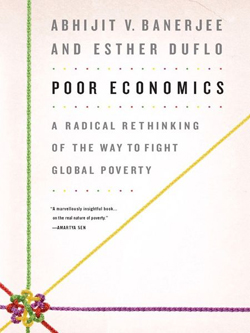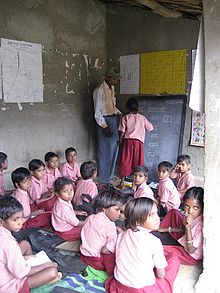Mohan Singh Mehta (1895-1986) was founder of Vidya Bhavan group of institutions and Seva Mandir in Udaipur, Rajasthan, India.

Bhogilal Pandya (1904-1981) was a freedom fighter and social worker from Dungarpur in the Indian state of Rajasthan. On 3 April 1976, the Government of India awarded him the Padma Bhushan for his social services. The Padma Bhushan is the third-highest civilian award in the Republic of India, given for distinguished service to the nation. For his championing of education and rights for the poor and underprivileged, he is referred by the people of Rajasthan as "Gandhi of Vahgad". His home is in the Gandhi aashram area of Dungarpur.

Esther Duflo Banerjee, FBA is a French–American economist who is a professor of Poverty Alleviation and Development Economics at the Massachusetts Institute of Technology (MIT). She is the co-founder and co-director of the Abdul Latif Jameel Poverty Action Lab (J-PAL), which was established in 2003. She shared the 2019 Nobel Memorial Prize in Economic Sciences with Abhijit Banerjee and Michael Kremer, "for their experimental approach to alleviating global poverty".

The culture of Rajasthan includes many artistic traditions that reflect the ancient Indian way of life. Rajasthan is also called the "Land of Kings". It has many tourist attractions and facilities for tourists. This historical state of India attracts tourists and vacationers with its rich culture, tradition, heritage and monuments. It also has some wildlife sanctuaries and national parks.

Lake Pichola, situated in Udaipur city in the Indian state of Rajasthan, is an artificial fresh water lake, created in the year 1362, named after the nearby Picholi village. It is one of the several contiguous lakes, and developed over the last few centuries in and around the famous Udaipur city. The lakes around Udaipur were primarily created by building dams to meet the drinking water and irrigation needs of the city and its neighbourhood. Two islands, Jag Niwas and Jag Mandir are located within Pichola Lake, and have been developed with several palaces to provide views of the lake.

Abhijit Vinayak Banerjee is an Indian-born naturalized American economist who is currently the Ford Foundation International Professor of Economics at the Massachusetts Institute of Technology. He is co-founder and co-director of the Abdul Latif Jameel Poverty Action Lab (J-PAL), an MIT based global research center promoting the use of scientific evidence to inform poverty alleviation strategies. In 2019, Banerjee shared the Nobel Memorial Prize in Economic Sciences with Esther Duflo and Michael Kremer, "for their experimental approach to alleviating global poverty." He and Esther Duflo are married, and became the sixth married couple to jointly win a Nobel or Nobel Memorial Prize.

The Abdul Latif Jameel Poverty Action Lab (J-PAL) is a global research center working to reduce poverty by ensuring that policy is informed by scientific evidence. J-PAL conducts randomized impact evaluations to answer critical questions in the fight against poverty, and builds partnerships with governments, NGOs, donors, and others to generate new research, share knowledge, and scale up effective programs.

Rachel Glennerster is an Associate Professor of Economics at the University of Chicago. Glennerster served as chief economist for the Foreign, Commonwealth & Development Office, formerly the Department for International Development (DFID), the UK's ministry for international development cooperation, after formerly serving on DFID's Independent Advisory Committee on Development Impact. She is an education sector academic co-chair at the Abdul Latif Jameel Poverty Action Lab (J-PAL). She was the executive director of J-PAL until 2017 and the lead academic for Sierra Leone at the International Growth Centre, a research centre based jointly at The London School of Economics and Political Science and the University of Oxford. She helped establish the Deworm the World Initiative, a program that targets increased access to education and improved health from the elimination of intestinal worms for at-risk children and has helped "deworm" millions of children worldwide.

Joe Madiath is an Indian social entrepreneur. He is the founder and former executive director of Gram Vikas, a non-governmental organisation based in Odisha, India. Gram Vikas uses common concerns for water and sanitation to unite and empower rural communities, including adivasi communities.

Poor Economics: A Radical Rethinking of the Way to Fight Global Poverty (2011) is a non-fiction book by Abhijit V. Banerjee and Esther Duflo, both professors of Economics at Massachusetts Institute of Technology (MIT) and Nobel Memorial Prize in Economic Sciences laureates. The book reports on the effectiveness of solutions to global poverty using an evidence-based randomized control trial approach. It won the 2011 Financial Times and Goldman Sachs Business Book of the Year Award.

Gram Vikas is an Indian non-governmental organisation based in Odisha, and founded in 1979. Gram Vikas works towards enabling rural communities to lead a dignified life. This is done by building capabilities of village communities, strengthening community institutions and mobilising resources. Gram Vikas works on six focus areas which are water, livelihoods, sanitation & hygiene, habitat & technologies, village institutions and education.

SBI Youth for India (SBI YFI) is an Indian rural fellowship programme initiated, funded and managed by the State Bank of India (SBI) in partnership with non-governmental organizations (NGOs). Fellows work with the NGOs on grassroot development projects.
The impact of microcredit is a subject of much controversy. Proponents state that it reduces poverty through higher employment and higher incomes. This is expected to lead to improved nutrition and improved education of the borrowers' children. Some argue that microcredit empowers women. In the US and Canada, it is argued that microcredit helps recipients to graduate from welfare programs. Critics say that microcredit has not increased incomes, but has driven poor households into a debt trap, in some cases even leading to suicide. They add that the money from loans is often used for durable consumer goods or consumption instead of being used for productive investments, that it fails to empower women, and that it has not improved health or education.
Anil Bordia was an Indian educationist, social activist and former civil servant, widely respected for his contributions to the Indian education sector. The Government of India honoured him, in 2010, with Padma Bhushan, the third highest civilian award, for his services to the fields of education and literature on education.
Moinee Foundation is a non-government organisation established in 2012, primarily working in the education domain, through techno-social innovations, by closely working with Government Bodies, Educational Institutes and local communities.

BOMA is a U.S. nonprofit organization and Kenyan NGO that works to provide poor women living in the arid and semi-arid lands of Northern Kenya with the educational, financial, and technological resources to lift themselves out of poverty. Its mission is to “empower women in the drylands of Africa to establish sustainable livelihoods, build resilient families, graduate from extreme poverty and catalyze change in their rural communities.”

Good Economics for Hard Times: Better Answers to Our Biggest Problems is a 2019 nonfiction book by Abhijit V. Banerjee and Esther Duflo, both professors of economics at MIT. It was published on November 12, 2019 by PublicAffairs (US), Juggernaut Books (India), and Allen Lane (UK). The book draws from recent developments in economics research to argue solutions to the issues facing modern economies and societies around the world, including slowing economic growth, immigration, income inequality, climate change, globalization and technological unemployment. It is their second collaborative book since the publication of their book Poor Economics: A Radical Rethinking of the Way to Fight Global Poverty (2011) and their first since becoming a married couple in 2015. The book's publication comes a month after Banerjee and Duflo were jointly awarded the Nobel Prize in Economics, shared with Harvard University professor Michael Kremer.
Delwara, nestled in the Aravalli Range hills, is a small town about 28 kms away from Udaipur, Mewar, and close to Eklingji Temple, on the way to the temple town of Nathdwara, in the state of Rajasthan, India. Delwara was originally known as ‘Devkul Patan Nagri’, which means the town of god. It boasted over 1500 temples at one time, out of which there were over 400 Jain temples. Delwara was the center of learning and culture before the 15th century AD. Around the middle of the 13th century, Raja Sagar, a Deora Chauhan and a descendant of Rao Kirtipal of Jalore, was a very brave king of Delwara (Mewar). Descendants of Raja Sagar sacrificed their lives whilst fighting alongside Ranas of Mewar against Muslim invaders. Raja Sagar was the progenitor of Bachhawat and Bothra clan of Oswals. Sagar's son, Kunwar Bohitya was immensely influenced and inspired by Jain philosophy. Samdhar, a grandson of Bohitya and a Deora Chauhan, was the first man in his genealogy to convert to Jainism.
The 2019 Nobel Memorial Prize in Economic Sciences was awarded jointly to the economist couple Abhijit Banerjee, Esther Duflo-Banerjee and their colleague Michael Kremer "for their experimental approach to alleviating global poverty". Banerjee and Duflo are the sixth married couple to jointly win a Nobel Prize. The pressed release of the Royal Swedish Academy of Sciences noted:
"The research conducted by this year's Laureates has considerably improved our ability to fight global poverty. In just two decades, their new experiment-based approach has transformed development economics, which is now a flourishing field of research. They have laid the foundations of the best way to design measures that reduce global poverty"
Emily Breza is an American development economist currently serving as the Frederic E. Abbe Professor of Economics at Harvard University. She is a board member at the Abdul Latif Jameel Poverty Action Lab, and an affiliated researcher at the International Growth Centre and National Bureau of Economic Research. Breza's primary research interests are in development economics, in particular the interplay between social networks and household finance. She is the recipient of a Sloan Research Fellowship.














